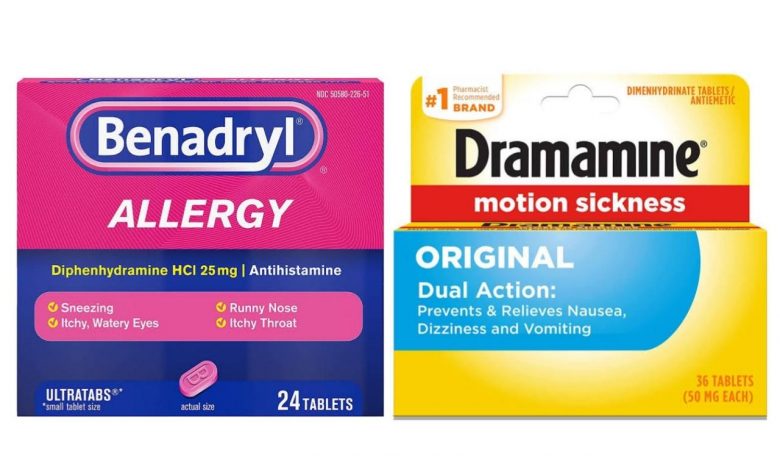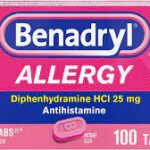Is Benadryl And Dramamine The Same Thing?

No, Dramamine and Benadryl are two different drugs. Dramamine is a brand of dimenhydrinate an antihistamine that reduces the effects of the natural chemical histamine in the body. Dramamine is used to treat or prevent nausea, vomiting, and dizziness associated with motion sickness.
On the other hand, Benadryl is a brand of diphenhydramine a medication that’s also classified as an antihistamine but is used to help relieve symptoms of hay fever (seasonal allergies), other allergies, and the common cold, as well as itchy skin due to insect bites, hives, and other causes.
Benadryl is effective for decreasing itchy skin from hives. It’s often considered a first-choice treatment for hives. But although it’s effective for decreasing symptoms of seasonal allergies, Benadryl isn’t often used for this purpose. This is due to side effects such as sleepiness.
What are the other differences between Dramamine VS Benadryl?
Although Dramamine and Benadryl share similarities in terms of drug class (antihistamines) and their ability to cause sleepiness they differ in many ways which include:
Active ingredients: The active ingredient in Dramamine (dimenhydrinate) is a combination of two drugs – diphenhydramine and 8-chlorotheophylline which competitively blocks H1 receptors, thereby preventing the actions of histamine on bronchial smooth muscle, capillaries, and gastrointestinal (GI) smooth muscle. Benadryl contains diphenhydramine which acts as an inverse agonist at the H1 receptor, reversing the effects of histamine on capillaries, reducing allergic reaction symptoms.
The onset of action: Most people who take Dramamine can expect some relief from nausea and vomiting within one hour of taking any form of Dramamine. Benadryl on the other hand is absorbed quickly in the body. You’ll probably notice the effects within about 20 to 30 minutes. The medicine should continue to work for about four to six hours.
Side effects: In terms of the side effects Dramamine and Benadryl also differ but not so significantly. Common Dramamine side effects include:
• blurred vision
• dizziness
• drowsiness
• dry mouth, nose, or throat
• excitement or hyperactivity (especially in children)
• fainting
• headache
• nausea
• new or worsening dizziness
• problems with coordination
• ringing in the ears
Benadryl can cause the following side effects:
• constipation
• dizziness
• drowsiness
• dry mouth, nose, and throat
• excitement (especially in children)
• headache
• increased chest congestion
• loss of appetite
• muscle weakness
• nausea
• nervousness
• vomiting
Are Dramamine and Benadryl pharmacologically the same?
According to an in-depth answer provided by John Ferguson a Neuropharmacologist, they are basically the same drug. Benadryl is diphenhydramine (bonded in a hydrochloride salt formulation). Dramamine is also diphenhydramine but bonded to 8-chlorotheophylline, which whoever put the two together decided to give a different name altogether.
The only functional difference between the medications is that upon dissociation, the hydrochloride salt (which is converted to hydrochloric acid in the stomach) possesses no bioactivity, while 8-chlorotheophylline goes on to be absorbed and pass the blood-brain barrier, where it acts as a mild stimulant not fundamentally different from caffeine. The purpose of this is to reduce drowsiness produced by diphenhydramine, but within the therapeutic dosage range, the sedative effect of the diphenhydramine will always significantly outweigh the stimulant properties of the 8-chlorotheophylline.
So to sum things up, you wouldn’t really be functionally incorrect to think of Dramamine simply as Benadryl with just a pinch of caffeine.





